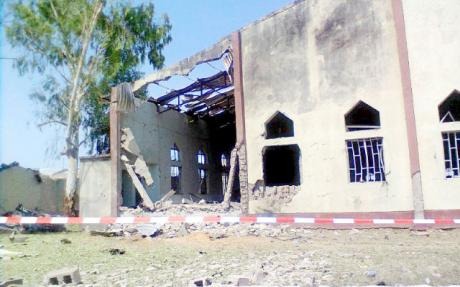
Islamic extremists bombed St. Rita’s Catholic Church in Kaduna, Nigeria on Nov. 2, killing at least seven Christians.
KADUNA CITY, Nigeria (Morning Star News) – A suicide bomb explosion that killed seven people at a Catholic church here on Sunday (Oct. 28) was the fourth such attack in Kaduna state in four months.
Less than two days after a festival aimed at reconciling Muslims and Christians in this northern Nigeria city, the suspected Islamic extremist rammed a car full of explosives into St. Rita’s Catholic Church in the Malali area of the Kaduna state capital, killing seven and injuring 145 others including the parish priest, an official from the National Emergency Management Agency (NEMA) told Morning Star News.
No one has claimed responsibility for the bombing, but the Islamic extremist group Boko Haram has did so for three church bombings that took place on June 17.
Witnesses reportedly said the Rev. Bonny Bazah was preparing to administer Holy Communion when the bomb was detonated. The priest was hospitalized at press time.
Of the 145 injured Christians, 90 had been discharged from hospitals on Wednesday (Oct 31) and 55 were still receiving treatment, according to NEMA. Among the dead was an 18-year-old woman, Laraba Sule, and 32-year-old Bitrus Audu, the agency reported.
Denied entrance at the church gate, the suicide bomber rammed a car into a church wall near where the choir was located, according to local reports. The explosion tore an entire section out of a church wall and destroyed the roof, and its force reportedly damaged surrounding structures.
Several parishioners told Nigerian press that many people died in the blast, suggesting that officials may be concealing a greater death toll in an effort to prevent an outbreak of sectarian strife. State Commissioner of Police Olufemi Adenaike appealed for calm as Christian youths reportedly mounted reprisal attacks that left two people dead. He said security agencies were doing their best to provide protection to Christians in their places of worship.
“I know the people are very bitter, but let I plead with them to allow us handle the situation,” he said. “We will ensure that Christians are provided with our men to protect them in their churches.”
Boko Haram, which seeks to impose strict sharia (Islamic law) throughout Nigeria, took responsibility for the June bombing of two churches in Zaria and one in Kaduna. In Zaria, suicide bombers on June 17 carried out attacks on the Evangelical Church Winning All in the Wusasa area of the city, killing at least 24, and the Catholic Christ the King Cathedral in the Sabon Gari area, killing at least 16. In Kaduna, the group bombed a Pentecostal church, Shalom Church, where at least 10 died.
Boko Haram has targeted churches, state offices, law enforcement sites and some moderate mosques in its effort to destabilize the government.
Nigerian political leaders and others lamented that the attack on St. Rita’s church came just two days after Christians in the city joined Muslims for the Islamic Eid al-Adha celebration (Festival of the Sacrifice), or Babbar Sallah in Nigerian languages, in remembrance of God providing Abraham a ram to sacrifice in place of his son Isaac. The initiative was organized by the Christian-Muslim Peace and Unity Initiative of Nigeria.
The Jama’atu Nasril Islam, a Muslim umbrella group headed by the Sultan of Sokoto, Alhaji Muhammad Sa’ad Abubakar, condemned the attack and called for calm and restraint.
The Most Rev. Matthew Man’oso Ndagoso, archbishop of Catholic Diocese of Kaduna, visited hospitals where the dead and the injured arrived this week. He expressed sadness over the bomb attack and urged Christians to pray for an end to evil.
The population of the Archdiocese of Kaduna was reportedly only 9.2 percent Catholic in 2011. Christians make up 51.3 percent of Nigeria’s population of 158.2 million and live mainly in the south, while Muslims account for 45 percent and live mainly in the north. But those practicing indigenous religions may be as high as 10 percent of the total population, according to Operation World, so the percentages of Christians and Muslims may be less.
Nigeria’s President Goodluck Jonathan described the attack as “barbaric, cruel and uncalled for.” Presidential spokesman Reuben Abati said on the day of the attack that the Nigerian government would step up its war against terrorism, “as the country cannot afford to succumb to the forces of evil.”
###
© 2012 Morning Star News. Articles may be reprinted with credit to Morning Star News.
- Islamic extremists bombed St. Rita’s Catholic Church in Kaduna, Nigeria on Nov. 2, killing at least seven Christians.

Speak Your Mind